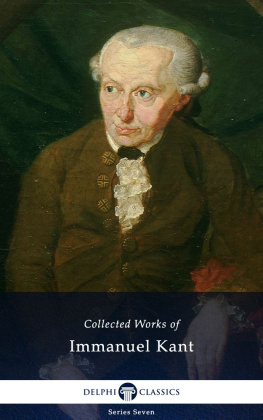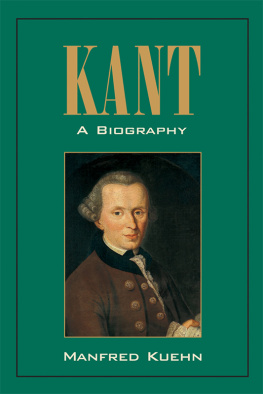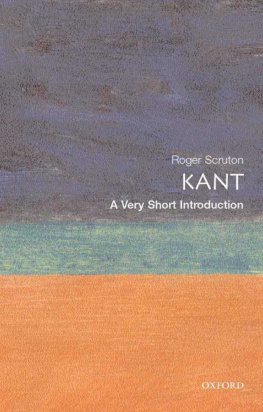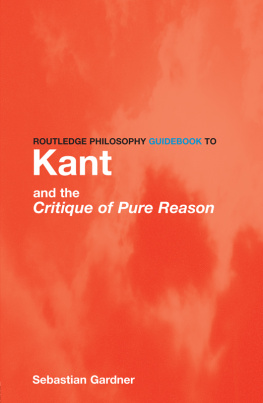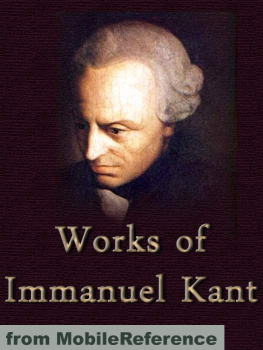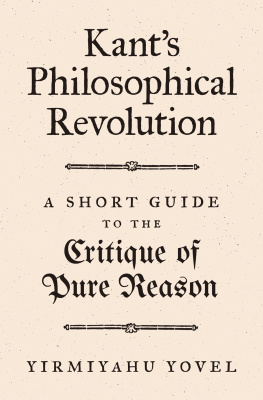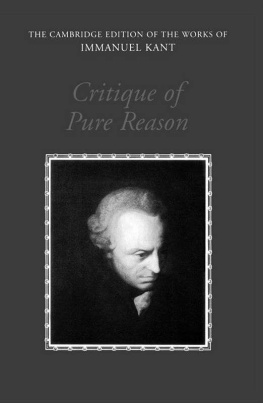J. Colin McQuillan - Immanuel Kant: The Very Idea of a Critique of Pure Reason
Here you can read online J. Colin McQuillan - Immanuel Kant: The Very Idea of a Critique of Pure Reason full text of the book (entire story) in english for free. Download pdf and epub, get meaning, cover and reviews about this ebook. year: 2016, publisher: Northwestern University Press, genre: Detective and thriller. Description of the work, (preface) as well as reviews are available. Best literature library LitArk.com created for fans of good reading and offers a wide selection of genres:
Romance novel
Science fiction
Adventure
Detective
Science
History
Home and family
Prose
Art
Politics
Computer
Non-fiction
Religion
Business
Children
Humor
Choose a favorite category and find really read worthwhile books. Enjoy immersion in the world of imagination, feel the emotions of the characters or learn something new for yourself, make an fascinating discovery.

- Book:Immanuel Kant: The Very Idea of a Critique of Pure Reason
- Author:
- Publisher:Northwestern University Press
- Genre:
- Year:2016
- Rating:4 / 5
- Favourites:Add to favourites
- Your mark:
- 80
- 1
- 2
- 3
- 4
- 5
Immanuel Kant: The Very Idea of a Critique of Pure Reason: summary, description and annotation
We offer to read an annotation, description, summary or preface (depends on what the author of the book "Immanuel Kant: The Very Idea of a Critique of Pure Reason" wrote himself). If you haven't found the necessary information about the book — write in the comments, we will try to find it.
Immanuel Kant: The Very Idea of a Critique of Pure Reason — read online for free the complete book (whole text) full work
Below is the text of the book, divided by pages. System saving the place of the last page read, allows you to conveniently read the book "Immanuel Kant: The Very Idea of a Critique of Pure Reason" online for free, without having to search again every time where you left off. Put a bookmark, and you can go to the page where you finished reading at any time.
Font size:
Interval:
Bookmark:
J. Colin McQuillan
Northwestern University Press
Evanston, Illinois
Northwestern University Press
www.nupress.northwestern.edu
Copyright 2016 by Northwestern University Press. Published 2016. All rights reserved.
Library of Congress Cataloging-in-Publication Data
Names: McQuillan, J. Colin, author.
Title: Immanuel Kant : the very idea of a Critique of pure reason / J. Colin McQuillan.
Description: Evanston, Illinois : Northwestern University Press, 2016. | This book began as a doctoral dissertation in philosophy at Emory University. | Includes bibliographical references and index.
Identifiers: LCCN 2016017436 | ISBN 9780810132481 (pbk. : alk. paper) | ISBN 9780810132450 (cloth : alk. paper) | ISBN 9780810132498 (e-book)
Subjects: LCSH: Kant, Immanuel, 17241804. Kritik der reinen Vernunft. | Criticism (Philosophy) | Knowledge, Theory of. | Reason.
Classification: LCC B2779 .M38 2016 | DDC 121dc23 LC record available at https://lccn.loc.gov/2016017436
A note to the reader: This e-book has been produced to offer maximum consistency across all supported e-readers. However, e-reading technologies vary, and text display can also change dramatically depending on user choices. Therefore, you occasionally may encounter small discrepancies from the print edition, especially with respect to indents, fonts, symbols, and line breaks. Furthermore, some features of the print edition, such as photographs, may be missing due to permissions restrictions.
This book began as a doctoral dissertation in philosophy at Emory University. I am very thankful for the guidance and support of my dissertation director, Rudolf Makkreel. I owe special thanks to Ursula Goldenbaum for the many hours she spent with me in directed studies. Rudi and Ursula taught me much of what I know, though they should not be blamed for any mistakes I have made.
The research that led to this book began in Germany, where I enjoyed the Gastfreundschaft of Jrgen Stolzenberg, Robert Schnepf, and Uli and Bella Ruth Reichard at the Martin-Luther-Universitt Halle-Wittenberg. My friends in Berlin helped make the months I spent in that city some of the most productive and enjoyable I have ever experienced. When I returned to the United States, I benefited from the advice of Karl Ameriks, David Carr, and David Pacini, who also served on my dissertation committee. The recommendations of Karin de Boer, Andrew Cutrofello, Verena Erlenbusch, Joseph Tanke, and the reviewers for Northwestern University Press have also been extremely helpful. My editor, Henry Carrigan, was very patient as I revised and then rewrote the manuscript.
I probably would not have written this book or studied philosophy without the encouragement of my parents, James and Eileen McQuillan. I am also grateful to have friends like Christina Nickel-Somers, Nate Holdren and Angelica Mortenson, Tzuchien Tho and Amy Anderson-Tho, Joseph Tanke and Molly Slota, Andrew Ryder, Christopher Edelman and Amelia Morten Edelman, Alexander Cooper, Matthew and Jamie McAndrew, Smaranda Aldea and James Ives, and many others. Thanks are also due to my fellow graduate students at Emory University, my former colleagues at the Emory Writing Center and the University of Tennessee Knoxville, and my colleagues at St. Marys University.
This book is a study of the background, development, exposition, and justification of Kants Critique of Pure Reason. It differs from other books on the same subject by focusing on Kants conception of critique, rather than his arguments for the transcendental ideality of space and time, his deduction of the pure concepts of the understanding, or the objections he raises against traditional metaphysics in the Transcendental Dialectic. The latter have been studied in exhaustive detail, but up to this point there has not been a single work that explains why Kant called the Critique of Pure Reason a critique. I regard this as a serious oversight in an otherwise exemplary body of scholarship.
I realize this claim will be met with surprise, if not suspicion. In the end, there are very few commentaries, introductions, and guides that are helpful for understanding Kants conception of critique.
Books
While I do not claim to have understood set metaphysics on the sure path of science.
Although Moses Mendelssohn called him the all-crushing Kant in the Preliminary Remarks to his Morning Hours (1786), Kant did not The fact that this process did not continue after 1781 suggests that Kants conception of critique played a much greater role in the development of his critical philosophy than the scholarly literature would lead readers to believe.
This interpretation of Kants critique is supported by close readings of programmatic passages from the Critique of Pure Reason and other works; however, it requires that we overcome some of the prejudices many of us hold about the nature of critique and the aims of criticism. In order to begin this process, I survey the different senses in which the word critique was used during the Enlightenment in chapter 1. Kant called the Enlightenment the genuine age of criticism for a reason; critique and its cognates were extremely popular terms in in the eighteenth century. They were so popular and so widely used that some scholars have denied that it is possible to determine what they mean exactly; yet it is possible see what Kants critique has in common with other conceptions of critique and where it differs, by placing his terminology in its historical context and considering the background against which he defined his critical philosophy.
Having considered the historical context in which Kant formulated his critique in chapter 1, I begin to reconstruct the problem he intended his critique to solve in chapter 2. This problem can be traced back to Kants pre-critical attempts to determine the proper method of metaphysics, which began in the 1750s with the New Elucidation of the First Principles of Metaphysical Cognition (1755), but intensified after the success of his Inquiry Concerning the Distinctness of the Principles of Natural Theology and Morality (1764) in the Prussian Royal Academys prize-essay contest in 1763. While some scholars claim that Kant experienced a crisis during the 1760s and came to doubt the possibility and even the desirability of metaphysics, closer examination of works from this period reveals that Kant was making plans for an ambitious, systematic treatise on the proper method of metaphysics. He faced a number of difficulties as he tried to complete this treatise, but he never denied that metaphysics was possible or desirable.
Kants plans for a new and improved metaphysics continued to evolve in the early for his critical philosophy, because it is the critique of pure reason that explains how the pure concepts of the understanding can relate to objects.
Turning from the development of Kants critical philosophy to the Critique of Pure Reason itself, I consider in chapter 4 the definitions of a critique of pure reason that Kant presents in the Preface and Introduction to the first (A)
Finally, in chapter 5, I explore the justifications Kant offers for his critique in response to negative reviews and objections from empiricist and rationalist critics. In the Prolegomena to Any Future Metaphysics (1783), he argues that his critique is necessary of pure reason are still worth noting.
While I think these chapters make important contributions to Kant scholarship, I do not expect them to be the last word on Kants critique or its relation to his critical philosophy. On the contrary, I hope they inspire new debates about some of the most basic features of the critical philosophy, more informed discussions about why they are critical, and continued research on the ways Kant thought his critique would set metaphysics on the sure path of science. Given widespread doubts about the value of Kants theoretical philosophy and general skepticism about metaphysics, I think these developments are both necessary and worthwhile.
Font size:
Interval:
Bookmark:
Similar books «Immanuel Kant: The Very Idea of a Critique of Pure Reason»
Look at similar books to Immanuel Kant: The Very Idea of a Critique of Pure Reason. We have selected literature similar in name and meaning in the hope of providing readers with more options to find new, interesting, not yet read works.
Discussion, reviews of the book Immanuel Kant: The Very Idea of a Critique of Pure Reason and just readers' own opinions. Leave your comments, write what you think about the work, its meaning or the main characters. Specify what exactly you liked and what you didn't like, and why you think so.

